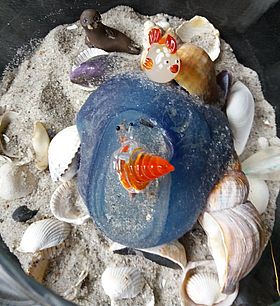Dr. Joachim Dengg
Schulkooperationen
GEOMAR Helmholtz-Zentrum für Ozeanforschung Kiel
Wischhofstr. 1-3
24148 Kiel
Tel.: 0431 600-4006
e-mail: jdengg(at)geomar.de
schulprogramme(at)geomar.de

Young people between 14 and 17 years from Poland, Romania and Germany were invited to a virtual summer school from July 12 to 23, 2021. The course took place on the computer screen at home (via video-conferencing) with some special off-line tasks for the students related to particular topics. The working language was English and Ocean@Home was free of charge.
Topics | Description | Requirements | Article | Application | Partners & Team

The goal of this course was to introduce the participants to important current issues of ocean research and to discuss those in the light of the United Nations’ Sustainable Development Goals. Focussing on the examples of the Baltic and Black Sea, the following topics were addressed:

Ocean experts introduced the topics above in live online seminars. The students worked in international teams and received a task related to the topic of the day. These could be solved online or offline, in the house or outside, but always in close cooperation within the teams. Every day ended with a second web conference by all participants of the summer school to discuss their findings.

In addition, teams of students worked on an overarching topic related to Ocean or Climate Sustainability, culminating in a joint presentation at the end of the course.

Requirements for participation were:

Here is a brief article summarizing the course.

This summer school was a joint course prepared and presented by the following scientific institutions and non-profit organizations:
Ocean@Home was supported by the German-Polish Youth Office (GPYO) in the framework of its program Experiment Austausch / Eksperyment Wymiana.

